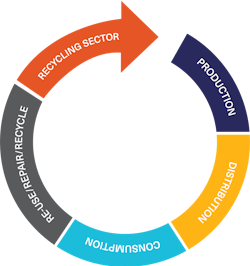Cooking oil as a fuel source? It’s a growing trend at airports, one likely to continue advancing in coming years.
Dallas Fort Worth International Airport (DFW) is a carbon-neutral airport today, with a goal to be a net-zero carbon airport by 2030. It has partnered with Neste to recycle waste cooking oil, which Neste uses to produce low-emissions renewable diesel fuel. The cooking oil is the raw material for the fuel, and DFW has been collecting more than 2,000 gallons per month.
“You can imagine the amount of waste cooking oil acquired with more than 57 concessionaires participating in our program throughout the airport terminals,” says Kris Russell, environmental program manager at DFW. “Whoever has a fryer in their kitchen has oil to replace.”
A Plan with a Purpose
In April 2019, DFW launched the initiative to consolidate and recycle waste cooking oil from each of its five terminals — more than 6 million square feet of space — and then hired a vendor for the recycling task. The contract was given to Mahoney Environmental, a subsidy of Neste, to provide a consolidated collection area at each terminal and collect the oil as needed, whether once a week or more.
There is now a location in each terminal where the oil can be taken and the team with Mahoney arrives to pick it up. Russell says part of the project was providing a safe and simple way for concession workers to transport the oil from their kitchens throughout the terminals. It used to be collected in a large drum barrel, put on a dolly and wheeled through the terminal out onto the curb and loaded onto a truck, he explains.
“This is now all happening back-of-house, not in front of the customers,” Russell explains. “There’s a ‘caddy’ we call it, parked right at the fryer, providing a direct connection to safely be emptied and then wheeled to the collection tank.”
Mahoney actually supplies this new collection system, then comes and collects the oil, processing it to remove impurities. The treated oil is sent to a Neste renewable refinery, of which there are three worldwide — in Singapore, the Netherlands and Finland.
Russell says the results have been great. The working conditions are safer, cleaner and simpler. The end product of renewable fuel aligns perfectly with the airport’s larger goals of reducing waste in all areas.
“The other nice thing is that the process is consistent in each terminal,” he adds. “It’s a very simple operation for the staff; no one has to manually heave heavy drums of oil around and the customer experience has also been improved.”
He explains that there is less noise, odor, chance for spills and just a nicer aesthetic for passengers, as well as employees. It all fits nicely into the EONS (Economic, Operational, Natural Resources, Social Responsibility) framework DFW uses to look for sustainability solutions.
This project checked all the boxes and in addition to cleaning up a messy oil process, has contributed to a fuel source that can be used like any other, a “drop-in” solution, according to Russell.
Cooking Oil to Fuel
Raquel Silverberg, Neste’s head of feedstock growth at Americas, says Neste and Mahoney offer a one-stop shop for airports through their kitchen services, the renewable diesel for ground vehicles and also sustainable aviation fuel for aircraft.
She explains that waste materials are being sourced from more than 40,000 airports, hotels, restaurants and other venues across the United States.
“Neste can trace all raw materials to their point of origin, which allows us to ensure all suppliers meet our sustainability standards,” Silverberg notes.
The renewable fuel supply chain starts where the used cooking oil is collected and for airports, this includes DFW and Chicago O’Hare International Airport (ORD).
“Airports can transform their waste management challenges into a sustainability and cost-reduction opportunity,” she explains. “At DFW, they were able to achieve their climate goals faster and boost efficiency.”
Customers around the world can use the fuel made by Neste to immediately replace fossil fuels, bringing the cycle full circle. In 2018, Silverberg says Neste signed a memorandum of understanding with San Francisco International Airport (SFO) and a number of leading airlines to accelerate the use of sustainable aviation fuel.
“Two years later, we made good on this promise,” she says. “Neste is now providing a continuous supply of sustainable aviation fuel to the airport with offtake agreements in place with Alaska Airlines, American Airlines, DHL and JetBlue.”
The company also is partnering with the Port Authority of New York and New Jersey, increasing its fleet’s use of sustainable transportation fuels for aircraft and ground vehicles.
The benefits have already been documented. Neste says that over the last five years, these renewable products have prevented nearly 40 million tons of CO2 equivalent from entering the air.
Other Good News
There is a lot of good news in this all for ground handlers. The process provides zero disruption to the ground handling crews at an airport, as sustainable aviation fuel can function simultaneously in place of traditional fuel. It requires no special handling, storage or engines.
“For example, Neste is providing sustainable aviation fuel to San Francisco International Airport using an existing pipeline and the airport’s fuel hydrant system,” Silverberg says.
While DFW comes up on its two-year anniversary of working with Neste on cooking oil collection, Russell says that the process as a whole has been successful and a learning experience.
One benefit for the concessionaires is the cost factor.
“There’s no cost to them to do this,” he explains. “They didn’t have to buy the caddies or anything. For them, it was simply a new process, and we had to communicate the details and educate them on the system.”
Other than some time requirements and learning curves to overcome, Russell says the operation has been smooth and, above all, a great story of making something that worked well, even better. In 2019, its first year, the five terminals collectively gathered 30,000 gallons of cooking oil and in 2020, 25,000 gallons.
“Neste and Mahoney have educated me that this is really an ideal waste oil for them to use for their process,” he explains. “It’s efficient and makes a truly drop-in fuel for any piece of ground support equipment.”
“Any company that wanted to switch to a renewable fuel, could, and not have to make any new equipment investment,” Russell adds. “We continue to look for ways to reduce waste and are glad this option exists for that reason, but also has a climate action benefit to it.”
Advice for Air Professionals
Silverberg says airports, airlines and ground handlers should first set bold climate goals, then learn from those who are doing well.
“San Francisco International Airport and DFW have expertise that can make developing a climate plan much easier,” she adds.
Neste officials say that conservatively: “The volume of used cooking oil generated by the largest 25 airports in North America is 9,600,000 pounds per year — enough waste to generate nearly 1 million gallons of advanced biofuels and, ultimately, prevent more than 7,831 metric tons of CO2 equivalent from entering the atmosphere.”
Russell says it is important when working on projects like this to build a solid stakeholder group at the beginning. The customer experience team was vital in this specific project, as they were aware of what was happening in the terminals and specifically, with concessions.
“They gave us a good understanding of the challenges the concessions operators were dealing with,” he explains, and says that together, the solution was developed which was good for everyone.
Neste officials say that when using waste and residue-based raw materials for the production of sustainable aviation fuels, it is possible to reduce life-cycle carbon emissions of flying by up to 80 percent. Silverberg encourages airports to think about waste management challenges as an opportunity to improve operational efficiency, but also reduce emissions, as DFW has realized firsthand, and shared.
For the ground support industry, this story is a positive one and something many airlines and ground service companies will be pursuing in coming years. The trends to lower emissions and recycled fuel are only increasing, and the opportunities to be a part of this are growing as well.
“There are wider benefits for airlines and communities surrounding airports,” Silverberg concludes. “Increased use of sustainable aviation fuel also translates to cleaner air for communities and directly reduces emissions and pollution from aircraft, enabling airlines to achieve their climate goals.”
As long as people love their french fries and flying, the two can go hand-in-hand in ways many have yet to experience, but is changing the world for good.
About the Author

Jen Bradley
Jen Bradley, owner of Bradley Bylines, is an aviation writer based in East Troy, WI. She may be reached via her website at www.bradleybylines.com.
